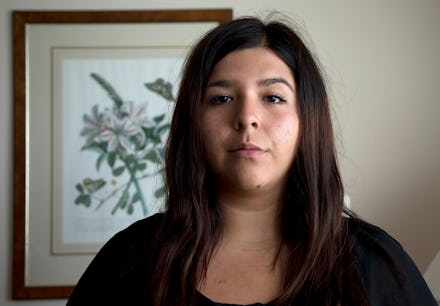The Student Debt Strike Movement Just Scored a Quiet Victory Against the Government

Two weeks ago, a group representing the "Corinthian 100," a movement of former Corinthian College students who are refusing to pay back their federal student loans on the basis that they received a fraudulent education, went to Washington.
They met with senior officials from the U.S. Consumer Financial Protection Bureau, the Department of Education and the Department of the Treasury, and demanded that their federal student loans be forgiven. They also lobbied for the government to establish a process that allows other students victimized by corrupt higher education institutions to seek forgiveness on their loans as well.
The meeting was polite, according to participants, but it did not bring about any commitments from the government. Department of Education officials told the Corinthian strikers and organizers that they would take 30 days to consider their grievances before making any decisions.
But the Education Department has just quietly admitted that it is pursuing a new policy that's in accordance with the Corinthian 100's demands.
A path to loan forgiveness: As Molly Hensley-Clancy at BuzzFeed News reports, one sentence in the penultimate paragraph of an otherwise unsurprising press release published Tuesday reveals the shift: "The Department is also working on a process to help federal student loan borrowers submit a defense to repayment of their federal student loans."
That statement marks the first public acknowledgement by the Education Department that it is establishing a formal process by which students can seek forgiveness on their federal student loans if they've been wronged by their school.
The process will work through something called "defense to repayment," a phrase contained in federal student loan promissory notes. Until very recently, the provision held little particular significance for borrowers. But in December, several Democrats in the Senate, led by Sen. Elizabeth Warren, argued that it serves as a foundation for forgiving student loans. They made the case that students who attended Corinthian Colleges — a for-profit operator of a network of schools that has been forced to shut down or sell all of its campuses after it was discovered that it engaged in predatory lending and fabricated information about job placement — certainly fit under the protections in the promissory note that states: "In some cases, you may assert, as a defense against collection of your loan, that the school did something wrong or failed to do something that it should have done."
Defense to repayment doesn't have an established precedent as a vehicle for redress, which is precisely why the Education Department's acknowledgment of it as a basis for a new process is so remarkable.
The devil is in the details. The technical details here are important. BuzzFeed News spoke to a source at the Education Department who said that the new policy will require students who claim defense to repayment to "prove injury and the amount of his or her loss."
While in the abstract that sounds reasonable, exactly how a student would have to go about proving injury is essential to determining how useful of a tool this will be for students attempting to have their loans forgiven. If the process becomes too tedious, then it will have failed to improve borrowers' lives. The Corinthian 100 strikers are asking that all former Corinthian students have their loans forgiven through a blanket measure so as to ensure that nobody is left out.
"There's no doubt that this is a tricky process for the Education Department – determining which students should have debts cancelled, depending on their circumstances and even when they attended college, is not particularly easy," Mark Huelsman, senior policy analyst at the think tank Demos, told Mic. "But the first step is recognizing that the government has complicity in this. This proves that the gatekeeping process for keeping predatory colleges away from federal loan dollars isn't particularly airtight, and it's great to see the Department acknowledge that students can be wrongfully impacted by that."
This is just the beginning of a massively complex maneuver that will affect not only Corinthian students, but countless other students in the future as well. Most of the details remain to be seen, but the early signs are reason for cautious optimism.
h/t BuzzFeed News